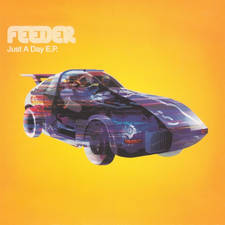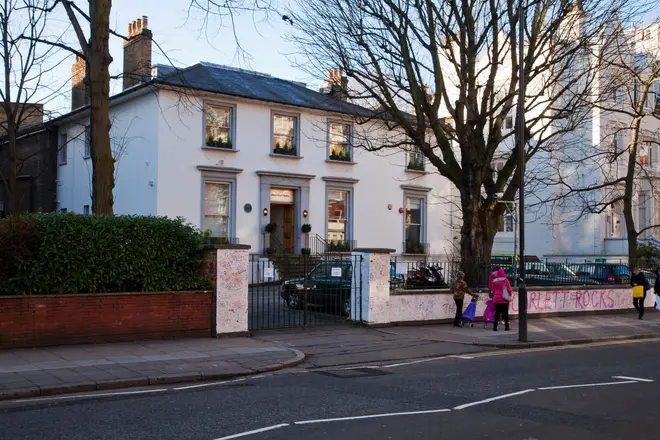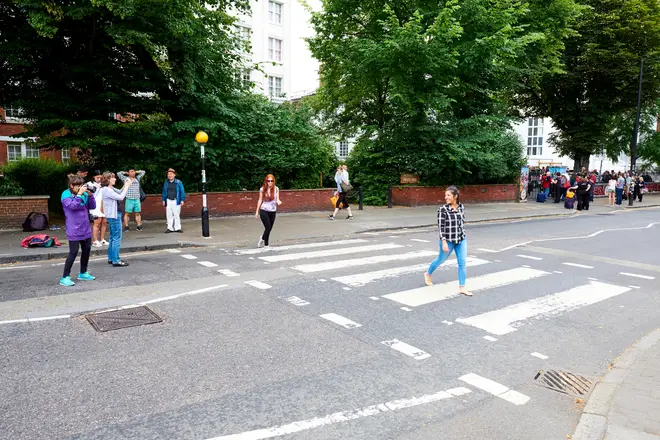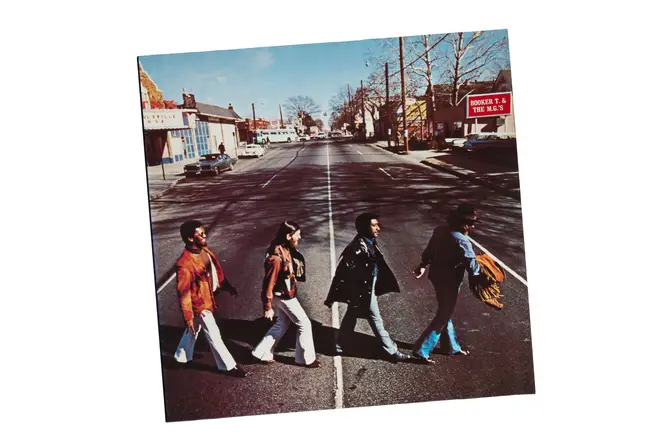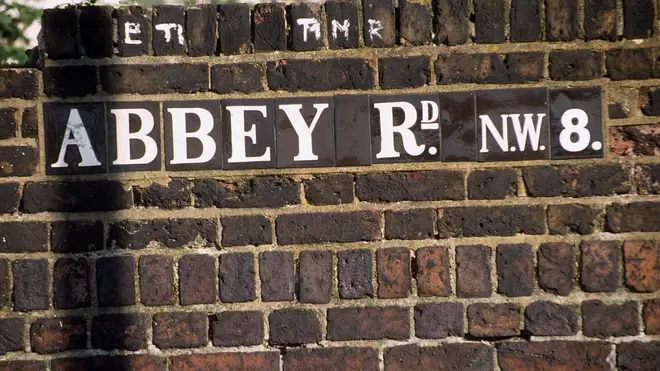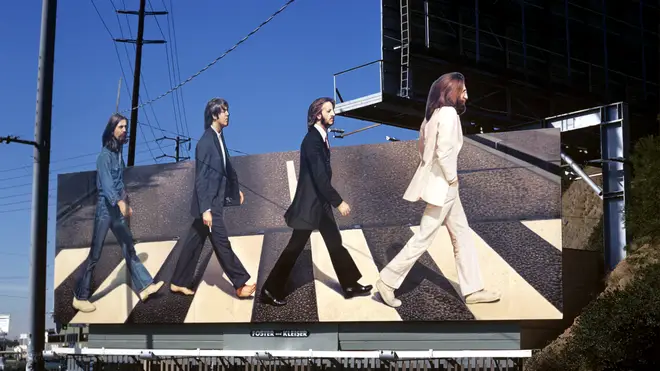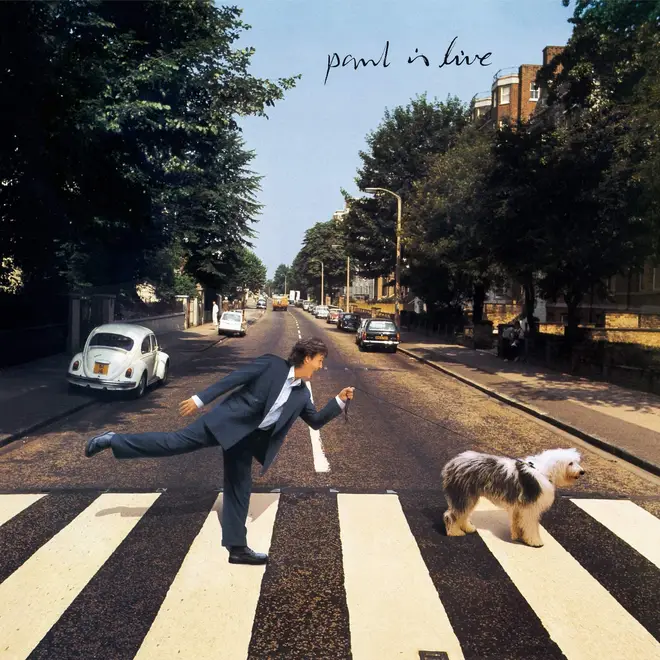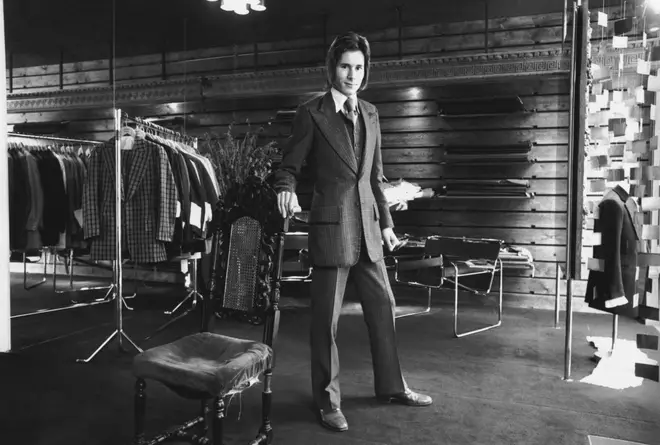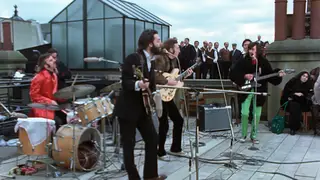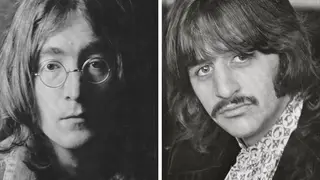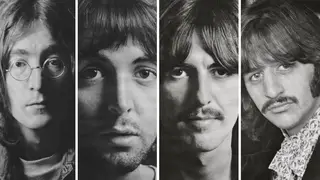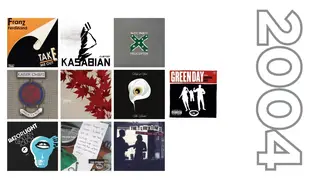The story behind The Beatles’ Abbey Road album cover
26 September 2024, 19:00
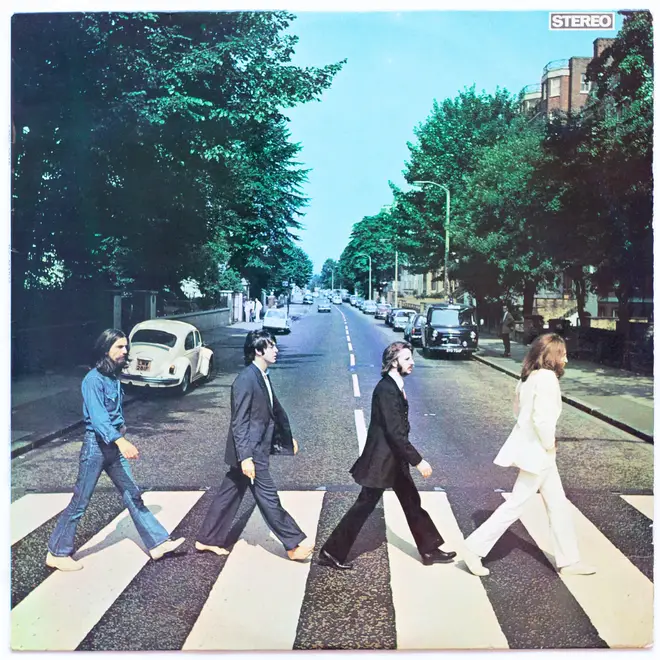
One of the most famous photographs of all time was shot in August 1969. Here's the story behind the Abbey Road album cover.
Listen to this article
Abbey Road was the final album The Beatles recorded and it was issued on Friday 26th September 1969 with a genuinely iconic cover photo. It pictures the four men - George Harrison, Paul McCartney, Ringo Starr and John Lennon - striding along a zebra crossing situated on Abbey Road, outside EMI studios in London, where the band had spent the majority of their ground-breaking recording career.
The LP and its memorable cover put the location on the map - previously known as plain old EMI studios, the building became known as Abbey Road Studios in light of this landmark album. Millions of people have made the pilgrimage to the crossing to have their photo taken and to pay their respects to the genius of the Fab Four and dozens of artists have parodied the sleeve, from The Simpsons to the Red Hot Chili Peppers.
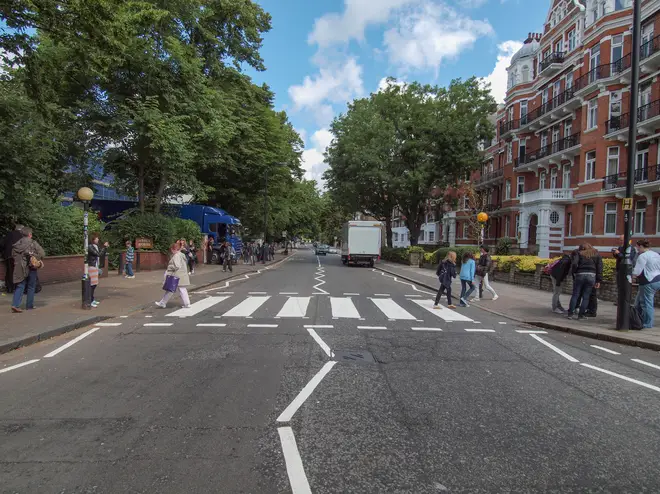
And it was all shot in a few hurried minutes on Friday 8th August 1969...
On that day John, George and Ringo were working on I Want You (She’s So Heavy) and The End inside the studio, while Macca worked on Oh! Darling, but before they set to business, they stepped outside of Number 3 Abbey Road to be photographed for the cover. Here are a few facts about that summer day in 1969 that you may not have heard before…
-
Where is the Abbey Road crossing exactly?
Before The Beatles came along, Abbey Road’s main claim to fame was being a stone’s throw from the location of Lord’s cricket ground. The crossing is situated at the southern-most point of Abbey Road, at the junction with Grove End Road, in the St John’s Wood area of North West London. The postcode for Abbey Road studios is NW8 9AY - if you go looking for the crossing near the Abbey Road station on the London Underground map, you’d be way off. That’s actually a Docklands Light Railway station in East London, miles away!
The front of Abbey Road Studios in London. Picture: Alamy -
The album wasn’t going to be called Abbey Road at all
As the sessions for the album came to an end, the four Beatles discussed a title for the record. One idea was to call it “Everest” after the cigarettes that engineer Geoff Emerick smoked during the sessions. When a plan was floated to take a cover photo in the foothills of the Himalayas to illustrate the title, the band went off the idea and instead went with the easiest plan possible - have the picture taken outside the studio and call it Abbey Road!
For the only time in their career, The Beatles presented the world with an album cover that didn’t feature their name, or the title of the LP at all. Designer John Kosh claimed that EMI bosses were furious, but argued: “The biggest band in the world, you don’t have to say who they are - everyone knows who they are.”

John Kosh Documentary Excerpt - Abbey Road
-
The four Beatles are pictured walking AWAY from the studio
The Beatles’ Let It Be album was released in May 1970, but the material had been recorded over a year earlier, meaning that Abbey Road was the last set of material to be produced by all four Beatles. In fact, the last session to see John, Paul, George and Ringo in the studio together was on 20 August 1969.
The zebra crossing at Abbey Road, London in 2017. Picture: Alamy It’s significant, then, that the photo chosen for the cover shows the four walking across the road with Abbey Road studios behind them - it’s the white building on the left of the picture. Lennon leads the group - which is also significant as he was the first member to permanently quit The Beatles.
Booker T and The MGs do their own version of the photo for their cover version of the Abbey Road album, McLemore Avenue in 1970. Picture: Alamy -
Only six photos were taken by photographer Iain Macmillan
Road traffic wasn’t the same 50 years ago, but Abbey Road was still a busy thoroughfare, which meant that photographer Iain Macmillan only had a short time to get his shot on his Hasselblad camera. A policeman halted the traffic as Macmillan climbed up a stepladder in the middle of the road. The Fab Four crossed the road back and forth three times as Macmillan fired off a shot each time. Paul McCartney looked at the contact sheet and it was decided that frame five was the best, with all four musicians marching boldly across the road.
-
The back cover photo is taken at the other end of Abbey Road
Anyone looking for the street sign that’s pictured on the back cover of Abbey Road will have a tough job. First of all, Beatles scholars Piet Schreuders, Mark Lewisohn and Adam Smith worked out that the location of the sign was at the OTHER end of the road, at the junction of Abbey Road and Alexandra Road, near to South Hampstead station. Secondly, the area was redeveloped in 1972 to make way for the Alexandra and Ainsworth housing estate, which opened in 1978.
One of the few remaining original "Abbey Road" signs pictured 1998. Picture: Brian Rasic/Getty Images -
Why is Paul McCartney barefoot on the cover of Abbey Road by The Beatles?
According to designer John Kosh, “The reason he kicked his shoes off was because they were too tight”. 8 August 1969 was a particularly sunny day and Macca lived around the corner in St John’s Wood, so he strolled around to the studios wearing sandals. For a classic McCartney prank, he crossed the road a couple of times without the footwear - it had nothing to do with being a “clue” that Paul McCartney had died (see below).
The Abbey Road billboard on Sunset Strip, LA, December1969. Picture: Robert Landau/Corbis via Getty Images -
What are the “Paul Is Dead” clues on the cover of Abbey Road?
In late 1969 a crazy conspiracy theory started doing the rounds that Paul McCartney had in actual fact been killed in a car accident in 1966, and had been replaced by a lookalike. Apart from Paul being out of step with his bandmates and walking barefoot, there were other “clues” on the sleeve that the Beatles had “planted” to get the message across to their fans.
The white Volkswagen Beetles that bears a number plate saying “28IF” - Paul would have been 28 IF he’d had survived (he’d actually just turned 27); the police van on the cover is usually seen at traffic fatalities; and the four Beatles represent a funeral procession: George is the gravedigger, Paul is the corpse, Ringo is the congregation and John is the priest.
McCartney parodied the whole affair in the title and album artwork for his 1993 concert album Paul Is Live.
Paul McCartney's Paul Is Live album (1993). Picture: Press -
Three of the Beatles are wearing designer suits
John Lennon, Paul McCartney and Ringo Starr are all wearing suits by the Welsh designer Tommy Nutter. George, however, was always his own man and rocked up that day in double denim. Nutter went on to design Jack Nicholson’s suit when he played The Joker in the 1989 Tim Burton version of Batman.
Tommy Nutter in his shop in November 1969. Picture: Jones/Evening Standard/Getty Images -
It wasn’t The Beatles’ final photo shoot
Despite Abbey Road being the last time The Beatles were in the studio together, the album cover shoot wasn’t the last piece of pictorial Beatle business. The four got together two weeks later, on Friday 22 August 1969 at John’s house at Tittenhurst Park in Ascot, Berkshire for one last photo shoot. Joining them on the day were Yoko Ono and Linda McCartney. One of the pictures was later used on the cover of the Hey Jude compilation LP.
#OTD 1969 #TheBeatles turned up at Tittenhurst Park (John's house in Ascot) for what turned out to be their last photo shoot together pic.twitter.com/G4CHcqP8ic
— The Beatles (@thebeatles) August 22, 2017
